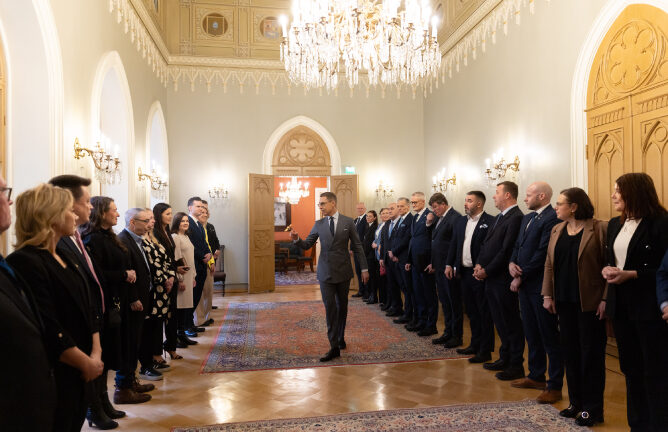Minister of Defence Mr. Nakatani Gen,
State Minister for Defence Mr. Honda Taro,
State Minister for Foreign Affairs Mr. Fujii Hisayuki,
State Minister for Internal Affairs and Communications Mr. Adachi Masashi,
Ambassador Jääskeläinen,
Esteemed guests,
Minasama, konbanwa, Nippon ni korarete ureshiidesu. (Good evening, everyone. I’m very glad to be in Japan.)
It is a great honour to attend this reception today to celebrate the Flag Day of the Finnish Defence Forces. This day is very special to me, both as President of the Republic of Finland and as Supreme Commander of the Finnish Defence Forces.
The Flag Day falls on the 4th of June, which is also the birthday of Marshal Gustaf Mannerheim. He was a great military leader, who had a remarkable career in the Finnish Defence Forces. In 1944, he became President of the Republic. Marshal Mannerheim was one of the most important Finnish figures during the horrific wars of last century. Acting first as a military leader, then as a political leader, he brought a sense of continuity to the tumultuous times during and following the war.
***
“Without knowing continuity, foundations cannot be established; without knowing change, new winds will not arise”.
These words were used by the great Edo period poet Matsuo Basho to describe the mindset behind the art of haiku. There is ageless wisdom in his words. They can be applied to any form of art – including the art of diplomacy and foreign policy.
Indeed, it seems to me that Basho managed to put into words what foreign and security policy should be all about.
In both Finland’s and Japan’s foreign and security policy, continuity has always been highly valued. Rightly so, and partly for historical reasons. Our foundations are built on values that remain unchanged.
At the same time, both Finland and Japan have shown that when faced with new challenges or adversity, we have the ability to adapt and rise to the occasion. We know change.
Since the time of Marshal Mannerheim and his successors, Finland has transitioned from active stability policy towards values-based realism. Universal values based on freedom, human rights and international rules remain at the core. At the same time, we recognise that the global problems of our time cannot be solved if we only work with those who share our views. Dialogue is needed.
***
Over the past few years, the world has changed more than anyone could have imagined: we have witnessed the COVID pandemic, the climate change, the suffering in the Middle East, tariffs and trade wars, and increasing transactionalism. Technology, development, the economy. Things that were supposed to unite us, are now tearing us further apart.
The global security order is rapidly changing: Russia’s brutal invasion of Ukraine, supported by countries such as North Korea, is threatening global stability. This sets a dangerous precedent for others seeking to challenge the multilateral rules-based international system. This is reflected also here in the Indo-Pacific region.
Together with like-minded countries including Japan, Finland condemns Russia’s unprovoked aggression towards Ukraine in the strongest possible terms. I would like to commend Japan for your continuous efforts to support Ukraine.
***
Bilateral relations between Finland and Japan, both diplomatic and military, go back more than 100 years. Many scholars suggest that Admiral Togo’s victory against Russia in the Russo-Japanese War (1904–1905) was a key factor in destabilising the Russian Empire and contributing to Finland’s independence from Russia.
As a curiosity, I would like to mention that the Finnish Pyynikin Brewing Company produced “Admiral Beer” (Amiraali Olut) for some years. Legend has it that this was to commemorate Admiral Togo’s victory.
In the past, our countries have cooperated in intelligence activities, such as breaking the Soviet encryption in the 1930s, and sharing expertise on the Winter War. Another curiosity is that ‘ahkio’, a sled pulled by soldiers on skis, is called an ‘akio’ in Japanese.
Today, Finland and Japan are strategic partners, who share a passion for inspirational architecture and design, as well as a commitment to developing innovative technologies.
To conclude, I would like to go back to the guiding principle of the poet Matsuo Basho. It is known as ‘Fueki Ryuko’, constancy and change. I propose that we adopt this as the North Star to guide our new, deeper cooperation. Let us preserve what is good and embrace new opportunities – together.

